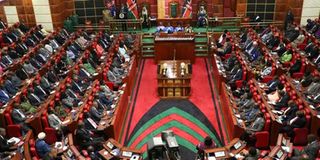For the country to develop, its national values must be understood and upscaled

A joint parliamentary sitting on March 27, 2014. The obsequious reference to county governors as Excellencies must cease so that the title reverts to the exclusive use of the President, his deputy and their exceptional spouses. PHOTO | BILLY MUTAI
What you need to know:
- The Budget Implementation Review Report shows that the counties paid Sh473 million as MCA sitting allowances in the first quarter of 2013/2014.
Kenya has the potential to become a middle income economy by 2030. The country has great sportsmen and women, and its national parks are renowned for their wildlife diversity.
Many Kenyans are innovative and hard-working. Recent discoveries in mineral deposits may transform the country’s economic landscape since they can provide critical inputs for industries.
All these developments, coupled with a fairly strong macroeconomic management, constitute the fundamentals for the Kenyan economy to take off.
However, the country will not realise Vision 2030 unless Kenyans take care of two simple things in life — civility and common decency.
To be civil requires that one appreciate the rule of law. Institutions (customs, practices and relationships) facilitate social-economic activities but these are embedded in, and enforced by, the country’s laws.
Article 10 of the Constitution demonstrates the import of civility as it stipulates that national values and principles of governance bind all Kenyans as they “apply and interpret the Constitution”. This Article is of unique importance to how one interprets Chapter 3 on the Bill of Rights.
Article 28 suggests that an individual’s inherent dignity is intertwined with civility. For individuals with no inherent dignity, adherence to the rule of law is inconceivable as they lack any dignity to be protected by the same law.
CASES OF INDECENCY
Let me cite a few cases of indecency. MPs and Members of County Assemblies claim allowances for committees’ sittings, yet they are salaried employees. The National Assembly has 30 parliamentary committees and each has membership of at least 25 MPs. Multiple memberships is allowed and an MP can claim up to three sitting allowances in a day.
Just to illustrate the impact of these allowances on the wage bill, we pick committees’ meetings on February 18. One committee had four sessions whereas four other committees had scheduled a session each at different times of the day.
With a membership of 143 MPs in these five committees, the minimum the government paid for sitting allowances was Sh715000.
The parliamentary calendar shows that 20 committee meetings were scheduled in February and therefore the public paid Sh14.3 million as sitting allowances to MPs.
The Budget Implementation Review Report shows that the counties paid Sh473 million as MCA sitting allowances in the first quarter of 2013/2014.
The public continues to experience mockery of public service delivery. The 2012 World Bank Service Delivery Indicators show that public schools reported 17 percentage points higher in teacher absence in class, and even registered less amount of time a teacher spends teaching during a school day, compared to private schools.
Yet, Kenyans are accustomed to frequent teachers’ strikes, agitating for better pay.
AMALGAM OF NATIONAL VALUES
Every year, the office of Auditor-General highlights cases of massive theft of public funds. Further, Lands ministry officials continue to facilitate the grabbing of public land and Kenyans risk acts of terrorism when some civil registry officials compromise the country’s security for 30 pieces of silver.
We must appreciate that development is inseparable from national values. The Constitution is itself an amalgam of national values restated as legal principles.
Kenyans must reconstruct these national values as desirable standards that reflect their sense of identity and pathways to improved wellbeing.
How does the country embed values into its development model? At individual level, the rule of law must bind all our actions and conduct. At the macro-level, two things must happen.
The first is to work towards political stability and economic progress by rewarding talent and performance. Secondly, Kenyans must ensure that those in positions of leadership have demonstrably sound traits of honesty and probity in public life.
Such leadership can promote work as a basic virtue, bring moderation, propagate adherence to the laws of the land, and ensure sobriety in the management of the nation’s resources.
Dr Chege is a senior policy analyst with the Kenya Institute for Public Policy Research and Analysis (Kippra). The views expressed here are those of the writer, not the institution’s.




